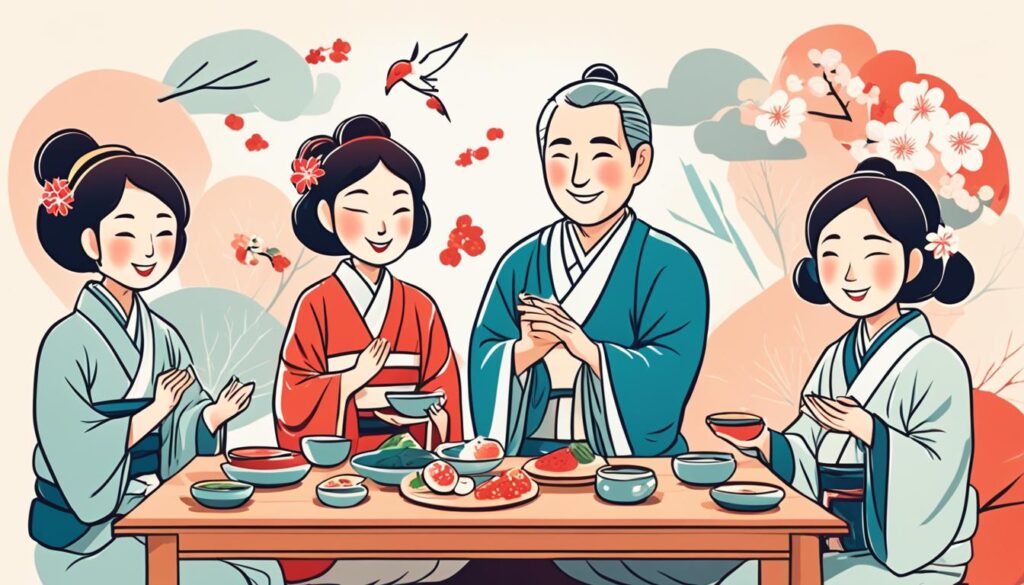In Japanese, the word for conversation is 会話 (kaiwa). Learning how to express “conversation” in Japanese is essential for effective communication in the language. Understanding the meaning, pronunciation, and cultural context of this term will help you engage in meaningful conversations with Japanese speakers.
When it comes to grammar, the word 会話 (kaiwa) functions as a noun and is used to refer to any form of verbal interaction or dialogue between two or more people. It is a broad term encompassing various types of conversations, from everyday chitchat to formal discussions.
Pronouncing 会話 (kaiwa) in Japanese involves the following sounds:
- か (ka) – pronounced like “ka” in “car”
- い (i) – pronounced like “ee” in “see”
- わ (wa) – pronounced like “wa” in “water”
Equivalent words for “conversation” in Japanese include 対話 (taiwa), カンバセーション (kanbasēshon), and 話 (hanashi). These words have slightly different nuances and usages, but they all convey the concept of conversation in Japanese. Familiarizing yourself with these words will expand your vocabulary and understanding of the language.
When written in Kanji, 会話 (kaiwa) is represented as 会話. Kanji, the Chinese characters used in Japanese writing, provide a visual representation of the word and can deepen your understanding of its meaning.
The term 会話 (kaiwa) is commonly used in various contexts in Japanese culture. Whether it’s engaging in casual conversations with friends, participating in business meetings, or attending language exchange sessions, understanding and using the term appropriately will facilitate effective communication and cultural integration.
Now that you have learned how to say conversation in Japanese and gained insights into its grammatical structure, pronunciation, written form, and cultural usage, you are well-equipped to improve your conversational skills in Japanese and connect with native speakers on a deeper level.
Japanese Translation of Conversation
In addition to 会話 (kaiwa), there are several other Japanese words that can be used to translate the term “conversation.” These include 対話 (taiwa), カンバセーション (kanbasēshon), and 話 (hanashi). Each of these words has slightly different nuances and usage, but they all convey the concept of conversation in Japanese.
Comparison of Japanese Words for Conversation
| Japanese Word | Meaning | Nuances |
|---|---|---|
| 会話 (kaiwa) | Conversation | The most commonly used word for conversation in Japanese. It refers to any verbal interaction between people. |
| 対話 (taiwa) | Dialogue | Implies a more formal or structured conversation, often used in the context of discussions or negotiations. |
| カンバセーション (kanbasēshon) | Conversation | A loanword from English, often used in informal or casual settings, particularly when referring to everyday conversations. |
| 話 (hanashi) | Talk | A more general term that can refer to both spoken and written communication, encompassing conversation as well as storytelling. |
Common Words for Conversation in Japanese
When engaging in a conversation in Japanese, it can be helpful to know some common words and phrases related to conversation. By familiarizing yourself with these terms, you can navigate conversations more effectively. Below are a few examples of words commonly used in Japanese conversation:
| Japanese Word | Meaning |
|---|---|
| 偶語 (gūgo) | Conversation |
| しゃべり (shaberi) | Talk or chat |
| 会談 (kaidan) | Conference or interview |
| 談話 (danwa) | Talk |
These words cover a range of conversational contexts and can be used to express different aspects of conversation in Japanese. Incorporating them into your vocabulary can enhance your ability to engage in meaningful discussions.
Conversation in Japanese Language Learning

When learning the Japanese language, conversation plays a crucial role in developing communication skills. Being able to express yourself and engage in conversations is essential for fluency. To learn how to speak conversationally in Japanese, it is important to practice conversational phrases, vocabulary, and grammar structures. Immersion in Japanese-speaking environments, such as language exchanges or conversation classes, can greatly facilitate the learning process.
By practicing conversations, you can improve your listening and speaking abilities, as well as your understanding of cultural context. Conversational practice allows you to apply your knowledge in real-life scenarios, honing your pronunciation, intonation, and fluency. Japanese conversations provide valuable opportunities to engage with native speakers and gain insights into the Japanese culture.
Language exchanges, where you can meet Japanese speakers who want to learn your native language, provide a mutually beneficial platform for practicing conversation skills. Such exchanges allow you to have guided conversations with native speakers, improving your vocabulary and grammar while helping them with their language learning journey. These exchanges offer a supportive and encouraging environment to practice your conversational skills without fear of judgment.
Another effective way to enhance your conversation skills is to enroll in conversation classes or language schools. These classes are specifically designed to focus on speaking and listening skills, providing structured lessons and opportunities for practical application. Native Japanese teachers guide you through conversations, correct your pronunciation, and provide valuable feedback to improve your overall proficiency.
To reinforce your learning, it is essential to practice conversational phrases regularly. Repeat and internalize common expressions and greetings, as well as useful questions and responses. This will help you to build confidence and fluency during conversations with Japanese speakers.
Benefits of practicing conversation in the Japanese language:
- Improves listening and speaking skills
- Enhances cultural understanding
- Boosts fluency and confidence
- Provides real-life application of language knowledge
- Allows interaction with native speakers
Useful Expressions for Conversation in Japanese
To engage in conversations effectively in Japanese, it is helpful to know some useful expressions. By familiarizing yourself with these expressions, you can participate in conversations more confidently.
| Expression | Japanese Phrase | English Translation |
|---|---|---|
| Greeting | おはようございます | Good morning |
| Appreciation | ありがとうございます | Thank you |
| Question | どうですか? | How is it? |
| Self Introduction | はじめまして、[Your Name]です | Nice to meet you, I’m [Your Name] |
| Opinion | 私は[your opinion]と思います | I think [your opinion] |
These are just a few examples of useful expressions for conversation in Japanese. Incorporating these phrases into your conversations can help you build rapport and effectively communicate in Japanese.
Other Words Related to Conversation in Japanese
In addition to the specific words for “conversation,” there are other Japanese words and phrases that are related to conversing. These include 英会話 (eikaiwa) which refers to English conversation, 電話会話 (denwa kaiwa) which means telephone conversation, and 会話を始める (kaiwa o hajimeru) which means to start a conversation. These words and phrases can be helpful for discussing different aspects of conversation in Japanese.
| Japanese Word/Phrase | Meaning |
|---|---|
| 英会話 (eikaiwa) | English conversation |
| 電話会話 (denwa kaiwa) | Telephone conversation |
| 会話を始める (kaiwa o hajimeru) | To start a conversation |
Learning Resources for Japanese Conversation
When it comes to learning Japanese conversation, there are various resources available to help you improve your skills. Whether you prefer traditional methods or the convenience of technology, you have plenty of options to choose from. Here are some popular resources that can assist you in your journey:
| Resource | Description |
|---|---|
| Textbooks | Detailed guides that provide structured lessons and exercises to build your conversational abilities. |
| Online Courses | Interactive platforms that offer comprehensive lessons, audio materials, and practice exercises for convenient learning at your own pace. |
| Language Exchange Programs | Opportunities to engage in conversations with native Japanese speakers and learn from each other’s language and cultural backgrounds. |
| Conversation Practice Apps | Mobile applications that offer conversation exercises, vocabulary drills, and pronunciation practice to enhance your speaking skills on the go. |
When choosing a resource, consider your learning style and goals. If you prefer a structured approach, textbooks or online courses may be beneficial. For those who value real-life interactions, language exchange programs can provide valuable experience. Additionally, incorporating conversation practice apps into your routine can offer continuous learning opportunities.
Remember, the key to mastering Japanese conversation is consistent practice. Take advantage of these resources and immerse yourself in conversations to refine your skills and build confidence in speaking Japanese.
Conclusion – Mastering Japanese Conversation
Mastering conversation in Japanese is a fundamental skill that enables effective communication in the language. To become proficient in conversing in Japanese, it is essential to learn the essential vocabulary, phrases, and expressions related to conversation. By understanding these linguistic components, you can express yourself fluently and accurately in various conversational situations.
Practicing through a variety of learning resources and immersive experiences is key to enhancing your conversation skills. Engage in real-life conversations with native speakers, participate in language exchange programs, or take advantage of conversation practice apps. These interactive experiences will help you sharpen your listening and speaking abilities, allowing you to confidently engage in Japanese conversations.
Embrace the opportunity to engage in conversations and practice regularly. Consistent practice will improve your skills and boost your confidence in speaking Japanese. Remember that language learning is a journey, and mastering conversation requires ongoing dedication and effort. Celebrate your progress along the way and stay motivated!
In conclusion, by immersing yourself in the world of Japanese conversation and engaging in regular practice, you can excel in expressing yourself and effectively communicating in Japanese. Embrace the language, explore various learning resources, and never hesitate to engage in conversations – let your Japanese conversation skills shine!

